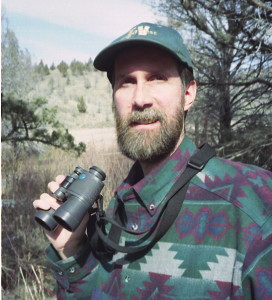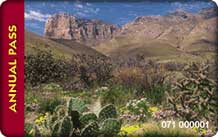New ‘America the Beautiful’ pass stirs controversy
Bend Weekly
Bend, Oregon
February 23rd, 2007
By SCOTT STAATS
I’m starting to get afraid of getting a ticket one of these days for not being able to see out my windshield. I already have a state park pass and a Sno-Park pass and now the government is offering yet another pass that will allow us to go out and enjoy our public lands.

The new pass, called the America the Beautiful – National Parks and Federal Recreational Lands Pass, is intended to benefit visitors to national public lands, according to the departments of Interior and Agriculture.
This new pass, which Congress authorized in 2004, covers recreation opportunities on public lands managed by the National Park Service, Fish and Wildlife Service, Bureau of Land Management, the Bureau of Reclamation and the U.S. Forest Service. The pass applies only to locations currently charging entrance and other user fees.
The $80 America the Beautiful Pass replaces the National Park Pass, Golden Eagle, Golden Age and Golden Access Passports. Those existing passes will remain valid until they expire. The Northwest Forest Pass is still valid for all places it was required in the past. Those with an America the Beautiful Pass no longer need a Northwest Forest Pass.
According to a government press release, Deputy Secretary of the Interior Lynn Scarlett was quoted as saying, “Our federal lands boast scenic vistas, breathtaking landscapes, and unique historic and cultural sites. This new interagency pass offers a cost-effective and easy option for those who plan to visit multiple federal recreation sites.”
 |
| New $80 “America the Beautiful” pass is stirring controversy (above). |
She went on to say, “The family vacation to these destinations is an American tradition. Visitors can now travel from a site managed by the Department of the Interior to a site managed by the Department of Agriculture without getting a different pass.”
There seems to be some confusion about this new pass and the Northwest Forest Pass. According to Les Moscoso, recreation operations supervisor for the Bend/Fort Rock Ranger District on the Deschutes National Forest, the Northwest Forest Pass is still viable this year and will be for almost another ten years. The Northwest Forest Pass costs $30 a year or $5 for a daily pass.
He agrees the new pass is costly at $80 but believes it is a good idea. He said the Northwest Forest Pass, which is regional, doesn’t get visitors into all of the places that the America the Beautiful Pass does, which is national.
“This new pass is not for everybody and that’s not what the intent was,” Moscoso explained. “It was designed for those who do a lot of visiting to national parks and national monuments. Wherever the NW Forest Pass is required, the America the Beautiful pass will cover that. So therefore, anyone getting an America the Beautiful Pass does not need a Northwest Forest.”
But not everyone agrees with this new pass. Scott Silver, Executive Director of Wild Wilderness in Bend, believes this recreation fee program is part of a much bigger plan to privatize our public lands.
“The reason I work on this issue is to fight the recreation industry’s efforts to commercialize, privatize and motorize recreation opportunities on America’s public lands,” said Silver. “I’m fighting the corporate takeover of nature and the Disneyfication of the wild.”
Among other problems that Silver has with the pass, he says that the phrase “America the Beautiful” is trademarked and can’t be used.
Sales of the new pass began the beginning of January. This is a 10-year program established on December 8, 2004 when the president signed an appropriations bill into which this had been inserted as a rider. Silver said the program would not have passed if it were its own bill.
Silver believes the plan for this new pass was to de-fund the agencies and to replace congressionally allocated funding with the ability to charge and retain fees. The big plan of “starving the beast” has done big corporations well, he added.
“Recreation has transformed from allowing people to walk in the woods and make their own experiences to those public lands being the backdrop for private recreation providers to develop opportunities to sell preformed experiences to paying customers,” he said.
Silver’s vision of future recreation on public land goes like this: “Instead of bouncing along a poorly maintained forest road until you get to a lake where there’s a primitive campground and a wonderful view and an opportunity to go fishing or put your canoe in the water, the road will be paved with all sorts of attractions along the way. When you get to the lake, it will be developed along the same lines as ski resorts. There will be a marina, golf courses, jet ski rentals, restaurant, KOA and more.”
No matter what your activity is in the forest, whether it’s hunting, fishing, hiking, or riding your horse or ATV, Silver believes you should be able to explore the public lands and to make your own experiences and not have to pay anyone for them.
Silver said that every national park is in the process of raising fees. The past entrance fee for Crater Lake National Park is still $10 but will increase to $20 in the near future. This is a way of forcing visitors into buying the $80 pass, he said.
There are four different passes in the new program. The first is the new annual interagency pass costing $80. The second is a $10 lifetime senior pass for U.S. citizens 62 and over. The third is a free lifetime access pass for citizens with permanent disabilities and the fourth is a free annual volunteer pass.
This last pass is also receiving some controversy. It is for volunteers who acquire 500 hours of service on a cumulative basis. That comes out to 12 ½ weeks or just over 3 months of total volunteer labor to get a free pass.
According to Silver, that comes out to 16 cents an hour. However, he points out that when agencies take into account volunteer hours, they use between $15 and $20 an hour as the value of volunteer service. He thinks this violates labor laws when the government gives out a free pass in exchange for volunteer labor.
Another Central Oregonian against this new pass is Bob Speik, who believes that recreation on public lands is being run as a business. Speik describes himself as a hiker, backpacker, mountain climber and author of his web site www.traditionalmountaineering.org.
“It’s part of the obligation of government to maintain our system of roads, sewers, trails and all the infrastructure that makes America great and facilitates our way of life,” he said. “Now, they have attempted to stop maintaining the public lands infrastructure, and corporations and private enterprises have jumped in and said that they will take on those tasks for a certain price.”
Speik believes that the new $80 pass is geared more toward motorized recreational vehicles, which he said represents a small percentage of the people who enjoy the outdoors. He also believes that the government is trying to close down the less frequented sites on public lands such as primitive campgrounds.
“I guess this all revolves around a philosophy of whether you want to run our public lands as a profit-making corporate venture or whether you want to have it be part of the American culture,” Speik concludes. “I believe that most people would like to maintain the culture of enjoying our public lands.”
Scott Staats is a fulltime outdoor writer who has lived in Central Oregon the last ten years. His articles have appeared in local, regional and national publications.
Other pages in this section

